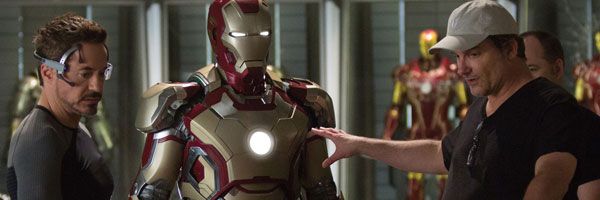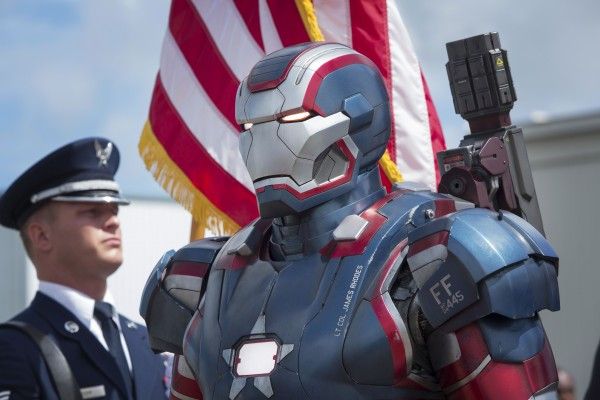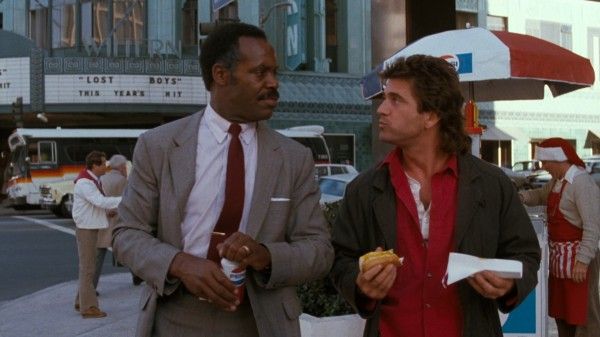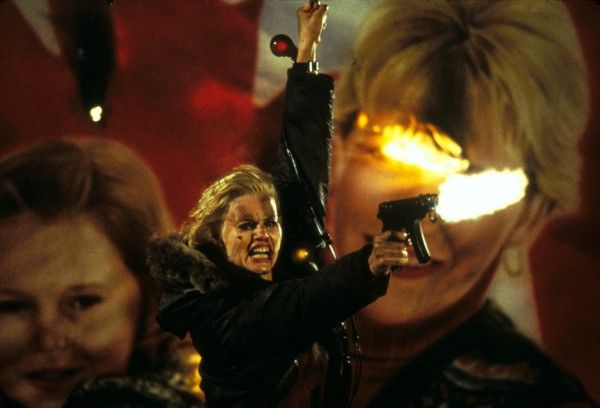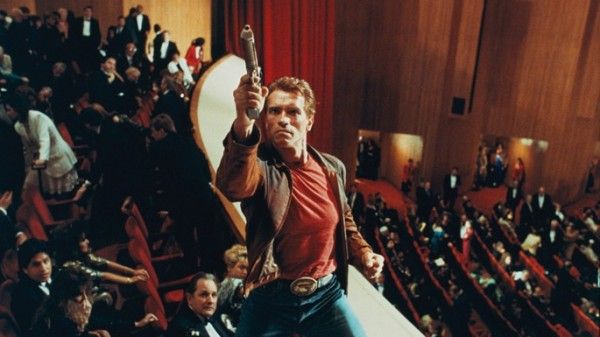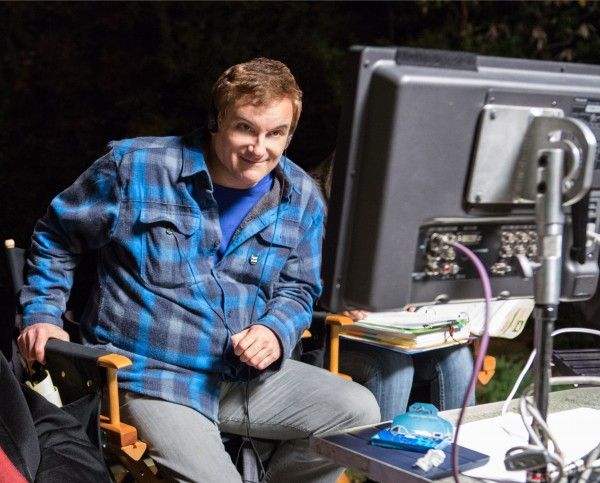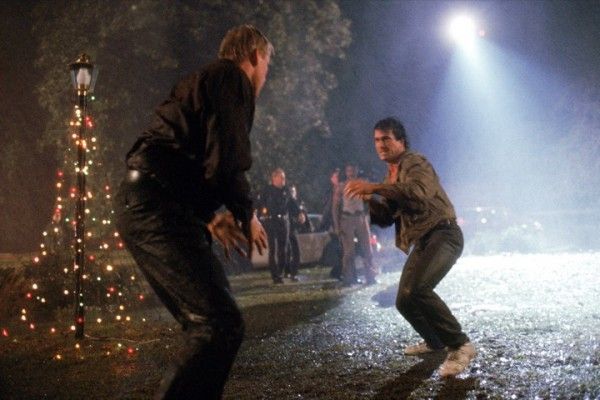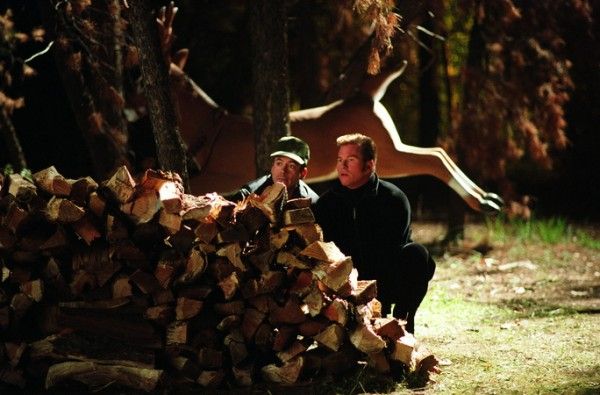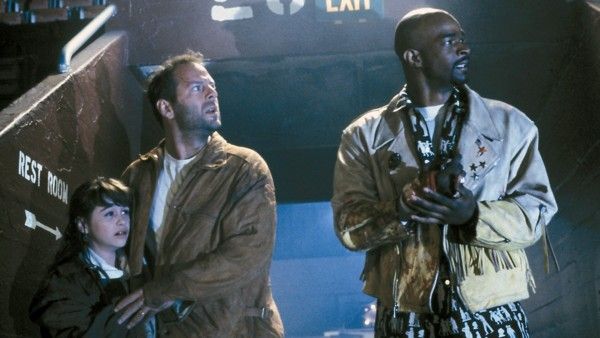It’s with great dismay that a proper discussion of Shane Black must begin with a talk about the MCU. Despite the tremendous entertainment value of Iron Man and the Captain America trilogy, as well as the lesser but still admirable thrills of the Avengers films, they’re more denoted by preconceived stylistic templates than actual personal style. Captain America: The Winter Solider, for instance, is a smartly paced, effective action film that wears its influences, from Alan J. Pakula to Arthur Penn, far too brazenly to be anything but an impressive homage. That isn’t meant as a knock necessarily, but when you stack that against the vibrant, intimate nuances and unique set pieces of Iron Man 3, one can see the lack of personal reflection, the mechanical function of the film over any genuine fascination with behavior and human decisions.
The problem with Chris Evans' Captain America is that he is perfect, and therefore he doesn’t really have to work anything out internally; all his decisions are correct and his altruism is telegraphed from the beginning of The First Avenger. So though I might be on Team Cap in Civil War, Robert Downey Jr.’s Tony Stark is a far more interesting character in every respect, the figure who actually has an inner conlict about who he is and what he does, where Cap only has outer conflicts, with the government, Red Skull, and, of course, Bucky with the good hair. And in Iron Man 3, all of Stark’s past decisions, his personal connection to his business, and his very character are called into question and hint at some dark, truly dramatic concepts that no other Marvel film, with the arguable, notable exceptions of Peyton Reed’s Ant-Man and James Gunn’s Guardians of the Galaxy, has even flirted with.
Iron Man 3 has as much in common with Douglas Sirk and George Cukor as it does with most of the MCU, but beyond that, the film serves as Black’s artistic manifesto, the most concentrated and exuberant expression of his perspective and personality. The core of the story is Tony’s dependence on his suit, how his persona has become bound psychologically to his best product, and how that speaks to his fear of mortality and emotional vulnerability. The film is rife with imagistic nods to these ideas in relation to the central protagonist, but is similarly true of a variety of characters, including Rebecca Hall’s corrupted “botanist,” Ben Kingsley’s The Mandarin, Guy Pearce’s Aldrich Killian, and Don Cheadle’s Captain Rhodes. A telling joke that runs throughout the film involves Rhodes’ mech-suit being renamed Iron Patriot rather than War Machine, a PR move to make America’s international proclivity for war sound more righteous and less aggressive.
Black’s main characters often exhibit two versions of themselves, and the two personas are often warring for most of his film’s runtime. In the mid-1990s, he penned The Long Kiss Goodnight, a hugely entertaining and genuinely progressive action epic that sees Geena Davis playing Samantha Cain, an amnesiac mother and housewife who comes to realize that she was one a spy named Charly Baltimore. She partners with a private investigator, Mitch Hennessy (a raucous, wonderful Samuel L. Jackson), and finally remembers everything, to the point that she becomes Charly again and tries to reclaim her life as an independent contract killer. As Black’s script turns, however, she can’t erase the character she invented, can’t simply toss away the family and life she’s made for herself as a necessity when her true self was nearly destroyed. It’s not only an insightful conception of a life of an actress, which Davis clearly relishes playing, but also a rebuke to the idea that heroes are moral or altruistic role models. Samantha is representative of a kind of fictional purity that is often lent to action-hero protagonists in modern genre films, created when the violent sociopath that Charly was could no longer sustain.
This concept is flipped, in a way, in Black’s script for Tony Scott’s The Last Boy Scout, which pairs Bruce Willis’ disgraced Secret Service agent turned private investigator with similarly defrocked football star Jimmy Dix (Damon Wayans). Here, Willis’ Joe Hallenbeck was once a straight arrow who actually saved the president’s life at one point, but who was humiliated when he stopped a crooked Senator from abusing and raping a young woman. For his part, Wayans’ character lost a tremendously promising career to the drugs he had to take to manage the pain that is part and parcel of that very job. Like many of Black’s characters, these are men that were dicked over by powerful figures, both governmental and corporate, but Black smartly never stresses the sadism of the powerful, never reduces his characters to victims of evil. These characters buy into the cynicism that they are seduced by, and it’s Black’s pickled, furious sense of humor in relation to this skepticism that often gives the film’s he writes and directs their distinct flavor.
Partnerships are also crucial to his style of writing. In fact, each one of his films is about a pairing: even Iron Man 3 is essentially about the partnership between Tony and his suit, also refracted in his relationships with a bright adolescent (Ty Simpkins), Pepper Potts (Gwyneth Paltrow) and Jarvis, voiced by Paul Bettany. Perhaps none of his scripts have built a more reinforced partnership than that between Riggs and Murtaugh (Mel Gibson and Danny Glover) in the Lethal Weapon films, which traces the doings of the aforementioned LAPD detectives. Of course, Black only scripted the first film, and provided the story idea for the second, and its no surprise that these two remain the classics while the two that followed are largely negligible. Black’s writing in the first two movies sets up a classic dichotomy between an older, wiser, and slower cop and a young, unhinged, but daring one, but it’s the nuances that he gives to the characters and their friendship that makes the movies what they are. In one of the best scenes in Lethal Weapon, Riggs bonds with Murtaugh’s family, who take great joy in making fun of the huge crush that Murtaugh’s eldest daughter has on her father’s partner.
For a writer who is known for his icy, smoke-stained characters with their wise-ass attitudes, Black is capable of a surprising propensity for warmth without yielding completely to sentimentality. Lethal Weapon and Lethal Weapon 2 are the best examples of this, but there’s a similar worn-in camaraderie and sense of love in the familial sequences of The Long Kiss Goodnight and The Last Boy Scout. And in the case of The Long Kiss Goodnight, Davis and Jackson form perhaps the most endearing bond of Black’s writing career: two natural outsiders finding something like true friendship in the ruins of their would-have-been legitimate lives.
It’s the lack of this sense of friendship and good humor that makes Kiss Kiss Bang Bang, Black’s first feature as a director, and The Monster Squad, his first script that sold, the lesser works in Black’s career. Though both of them still boast Black’s relishing of profanities and general wise-assery, mutual empathy and a shared feeling of being underestimated for all the wrong reasons don’t denote the central partnerships. In the case of Kiss Kiss Bang Bang, performances by Downey Jr. and Val Kilmer compensate for this lack of emotional awareness and personal detail, but The Monster Squad is a film that is only remarkable in the cleverness of the central premise and its mildly fascinating depiction of classic monsters. Would that Black’s focus had been on the relationships between the monsters rather than the obnoxious, broadly drawn kids who go after them.
Still, both of these films enjoyed something of a cult following upon their release, and Kiss Kiss Bang Bang is often cited as the film that signaled the resurrection of Robert Downey Jr. (I would argue that his striking supporting work in A Scanner Darkly and Good Night, and Good Luck were much more integral, leading to his revelatory performance in David Fincher’s majestic and menacing Zodiac.) In comparison, Last Action Hero, Black’s quasi-reunion with Arnold Schwarzenegger after Black played a supporting role in Predator, was dismissed almost immediately after being released. Coming back to the film now, however, Last Action Hero feels like Black’s most personal script before Iron Man 3, a wild retooling of the meta-movie that doubles as a critique of the action genre.
If Riggs and Murtaugh aren’t exactly the heroes you’d want or expect them to be, Jack Slater, the title character of a Die Hard-esque franchise in the world of Last Action Hero, is exactly what you think he is. At least, that’s what he is when he’s being watched by Danny Madigan (Austin O’Brien of My Girl 2 fame), a fanatical action-movie junkie. But when a magical ticket, gifted to Danny’s best friend and movie-theater owner (Robert Prosky of Christine and Hoffa) by Houdini, allows him to enter the world of the Jack Slater movies, Slater changes, and even more so when he enters Danny’s world, where pain and death are rendered actual dangers.
Stacked with an exquisite cast that includes Charles Dance, F. Murray Abraham, Anthony Quinn, and Mercedes Ruehl, as well as delightful cameos by Ian McKellan, Art Carney, and Tom Noonan, Last Action Hero at once celebrates the nonsensical wonder of the action genre while similarly deconstructing it with each frame. Black sees the magic in the worlds of action movies, and his films have galvanized the genre where so many others have grown crusty with misogyny and a terminal lack of invention. Where so many filmmakers have tried to pedal the seriousness of their action spectacles over the simple fun and exhilaration that these films have been built on, Black has balanced his knowledge of the genre’s past, its mechanics, with his own personality, which can be felt in every crude one-liner, every inappropriate gesticulation, and every creative set-pieces in his films. Like John McTiernan, the director of Last Action Hero, Black evokes something intimate about himself in every one of his bloody, crass scripts, like a man dancing a jig after tossing a villain into a propeller.

